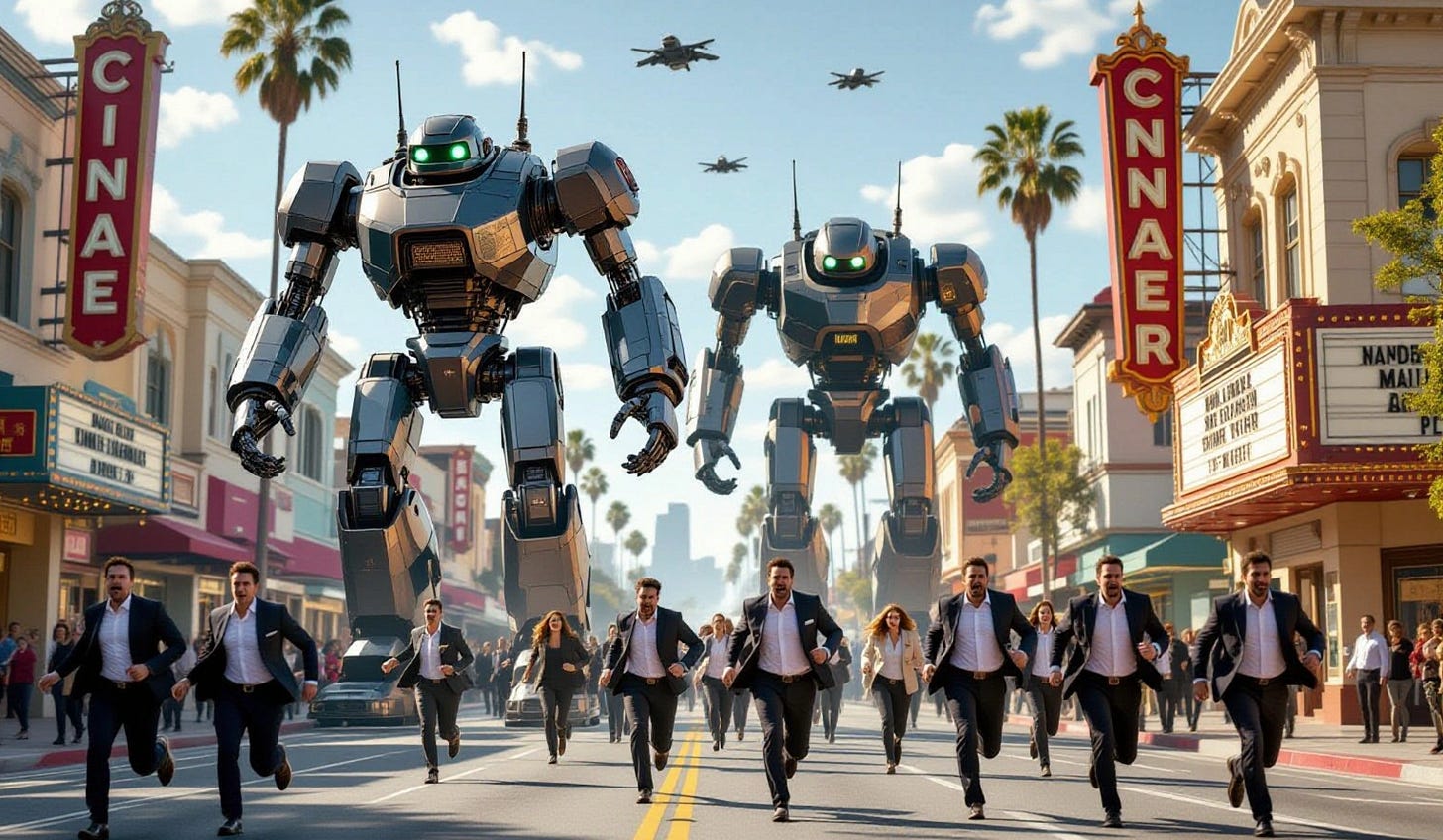In fall of 2020, the New York Times published an article titled “Designed to Deceive: Do These People Look Real to You?” The piece demonstrated how early artificial intelligence could create images of fictional people who could easily pass for real.
Fast forward to April of 2023 and the web was infatuated with an AI-generated video featuring Will Smith eating spaghetti. While the weird motions and bizarre features made it clear that it was phony, we all marveled at how a machine could replicate a human being doing something we could all imagine it doing.
Because of how quickly things are moving, it’s probably important to timestamp this article. It’s July 7, 2025. And the article will be outdated in less then a year. And that’s why I am putting my predictions out there now.
With the advent of Google’s Veo3 AI video generator, the game has completely changed, and traditional entertainment media is about to change… completely.
Check out this AI-generated movie trailer. I have clipped the audio so you can just focus on the video. Feel free to put whatever narration and music your head hears as an overlay.
Is it perfect? No.
But if this doesn’t signal the end of big-budget Hollywood cinema, I don’t know what does.
The movie industry is highly competitive. Studios are taking a huge risk with high-budget films that often flop. Why should they spend hundreds of millions of dollars on the next hopeful blockbuster when movies can be created for a fraction of the cost using artificial intelligence?
In fact, when we look at everything that goes into making a movie, what will happen to these jobs when those who can prompt their way to movie creation take the helm? These are just some of the jobs that are threatened by this incredible technology.
Pre-Production Roles:
Scriptwriters: AI tools can generate scripts or story outlines, reducing the need for human writers for initial drafts or formulaic content.
Storyboard Artists: AI can create detailed storyboards from scripts, automating visualization tasks.
Concept Artists: AI-generated art can replace human-drawn concepts for characters, environments, or props.
Production Roles:
Actors: AI did a mediocre job of recreating Will Smith a couple years ago, but the above trailer shows that it can now duplicate any human with great accuracy. Why pay $20 million to Brad Pitt for a month’s work when he’ll take $2 million to not even have to show up for production?
Cinematographers: AI can simulate camera angles, lighting setups, and shot compositions, though human oversight may still be needed for creative decisions.
Set Designers and Builders: Virtual sets created by AI (e.g., using game engines like Unreal Engine) can replace physical set construction.
Costume Designers: AI can design and render digital costumes, especially for CGI-heavy films, reducing the need for physical costume creation.
Makeup Artists: Digital makeup and effects applied via AI can eliminate some traditional makeup roles, particularly for fantastical or CGI characters.
Post-Production Roles:
Editors: AI can automate rough cuts, scene assembly, and even suggest pacing, reducing the workload for human editors.
Visual Effects (VFX) Artists: AI can generate complex VFX, such as explosions, weather effects, or crowd simulations, minimizing the need for manual VFX work.
Compositors: AI tools can seamlessly blend CGI with live footage, automating much of the compositing process.
Sound Editors: AI can generate or clean up sound effects and dialogue, potentially replacing some audio editing roles.
Other Roles:
Extras/Background Actors: AI-generated digital crowds or characters can replace human extras in many scenes. These are already low-paying jobs, but if you think wanna-be actors were starving in Hollywood before, you ain’t seen nothin’ yet.
Location Scouts: Virtual environments and AI-generated locations can reduce the need for physical scouting.
Production Assistants: Administrative tasks like scheduling or budget tracking can be automated by AI.
The game is changing and I guarantee that Hollywood, from both the film and television angles, are panicking.
The industry has been a walled garden where only the wealthy and powerful have a say in what gets greenlit for production.
That has changed. And there’s no going back. Pandora’s Box has been opened. The genie is out of the bottle. The toothpaste is out of the tube. And I’m running out of metaphors.
Prediction: It’s only a matter of time before we see a high-quality film completely produced in someone’s basement get massive attention.
The next Steven Spielberg, Martin Scorsese or Christopher Nolan are using AI video to create their masterpiece right now
The next Danny Elfman, John Williams or Hans Zimmer are using AI audio tools to make a film score that soars.
And the next Jerry Bruckheimer, George Lucas or Brian Grazer are gathering together their ragtag team to produce the blockbuster breakout that will capture the world’s attention. And they will do it for such a small amount of money that the very ground in Hollywood will collapse and fall into the Pacific Ocean (metaphorically speaking, of course… unless it really does trigger ‘the big one’ that the San Andreas Fault has promised for decades.)
If you think that is the end of it, I have yet to share the next evolution of entertainment powered by AI with you. It’s the truly mind-blowing part. Any guesses what happens next? Leave your predictions in the comments!






"And I’m running out of metaphors."
There's an AI for that. :-)
I have a theory: to prosper in an AI-infused economy, we humans will need to identify that which ONLY humans can do well. And then we need to do it even better so that the gap between human and AI is obvious.
In short, we need to be better humans.
That's easy to write, I know. But I think this is where you are headed, Joel, whether you know it or not. Call it a hunch.